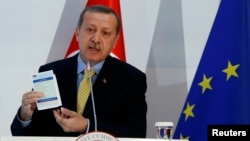ISTANBUL —
Ankara and the European Union have signed a much delayed agreement, under which Turkey will permit EU governments to send back migrants who have illegally entered the EU through Turkey. In return, Brussels has committed itself to talks on easing of visa requirements for Turks. Prime Minister Recep Tayyip Erdogan called the deal a "milestone" in relations between his country and the 28-member bloc, but obstacles remain.
The agreement, which was signed on Monday, is the latest effort to put Ankara’s EU membership bid back on track. Semih Idiz, a diplomatic columnist for the Turkish newspaper Taraf and the al-Monitor website, thinks the agreement will play well among Turks and could help stem hemorrhaging public support for the country’s EU bid.
"In the visa dimension, where restrictions are eased especially for businessmen, especially for people who are going back and forth to Europe for legitimate reasons or for very normal reasons, then the public mood will change. Turkish public opinion when it comes to the EU is extremely fickle," said Idiz.
Brussels had been pressing Ankara for two years to sign a re-admission agreement.
Richard Howitt, a member of the European Parliament’s committee on Turkey, said that while Ankara will receive plaudits in Brussels for signing the agreement, he is not sure whether the commitment to visa-free travel for Turks within three years can be achieved.
"I think it's questionable. Everything is problematic and difficult to achieve, but the visa issue is clearly one of the most sensitive. Because migration is a sensitive political issue. And so, yes, it's going to be extremely difficult to achieve in the current political climate," said Howitt.
Sinan Ulgen, a visiting scholar at Carnegie Europe in Brussels, says Turkish-EU relations remain cool despite this agreement.
"On the government side we don’t yet see this open embrace of Europe. It's more conditional at this point. But overall, the momentum towards Europe is still lacking in Turkey," said Ulgen.
Observers claim Ankara has become increasingly disillusioned over the slow progress of its EU bid, as well as recent criticism by Brussels over the Turkish authorities' crackdown on anti-government protests this summer.
Earlier this month, EU-Turkish tensions resulted in an angry exchange between Turkish government ministers and a visiting EU parliamentary delegation. Howitt, a member of the EU delegation, said relations have to improve if progress on Ankara’s bid is to be made.
"This is not the best moment in the history of inter-parliamentary relations between Turkey and the European Union and it has to get better. One of my calls was a return to diplomatic language. And that has not always been seen from leading politicians from the Turkish side. There has been some very hot language in the exchanges," explained Howitt.
Observers also point out that with the Turkish government facing critical elections next year, a boost in relations with the EU and the hope of visa-free travel will help its electoral prospects.
The agreement, which was signed on Monday, is the latest effort to put Ankara’s EU membership bid back on track. Semih Idiz, a diplomatic columnist for the Turkish newspaper Taraf and the al-Monitor website, thinks the agreement will play well among Turks and could help stem hemorrhaging public support for the country’s EU bid.
"In the visa dimension, where restrictions are eased especially for businessmen, especially for people who are going back and forth to Europe for legitimate reasons or for very normal reasons, then the public mood will change. Turkish public opinion when it comes to the EU is extremely fickle," said Idiz.
Brussels had been pressing Ankara for two years to sign a re-admission agreement.
Richard Howitt, a member of the European Parliament’s committee on Turkey, said that while Ankara will receive plaudits in Brussels for signing the agreement, he is not sure whether the commitment to visa-free travel for Turks within three years can be achieved.
"I think it's questionable. Everything is problematic and difficult to achieve, but the visa issue is clearly one of the most sensitive. Because migration is a sensitive political issue. And so, yes, it's going to be extremely difficult to achieve in the current political climate," said Howitt.
Sinan Ulgen, a visiting scholar at Carnegie Europe in Brussels, says Turkish-EU relations remain cool despite this agreement.
"On the government side we don’t yet see this open embrace of Europe. It's more conditional at this point. But overall, the momentum towards Europe is still lacking in Turkey," said Ulgen.
Observers claim Ankara has become increasingly disillusioned over the slow progress of its EU bid, as well as recent criticism by Brussels over the Turkish authorities' crackdown on anti-government protests this summer.
Earlier this month, EU-Turkish tensions resulted in an angry exchange between Turkish government ministers and a visiting EU parliamentary delegation. Howitt, a member of the EU delegation, said relations have to improve if progress on Ankara’s bid is to be made.
"This is not the best moment in the history of inter-parliamentary relations between Turkey and the European Union and it has to get better. One of my calls was a return to diplomatic language. And that has not always been seen from leading politicians from the Turkish side. There has been some very hot language in the exchanges," explained Howitt.
Observers also point out that with the Turkish government facing critical elections next year, a boost in relations with the EU and the hope of visa-free travel will help its electoral prospects.




